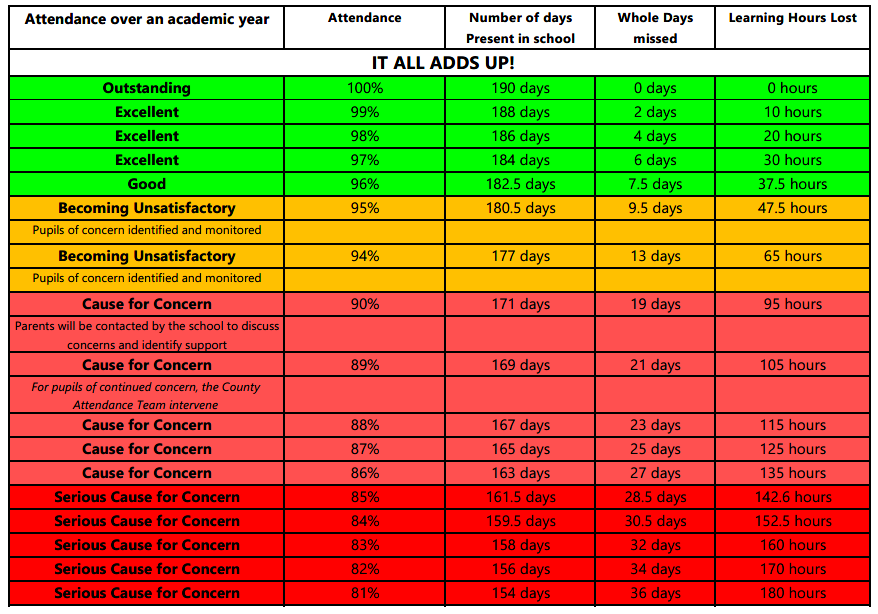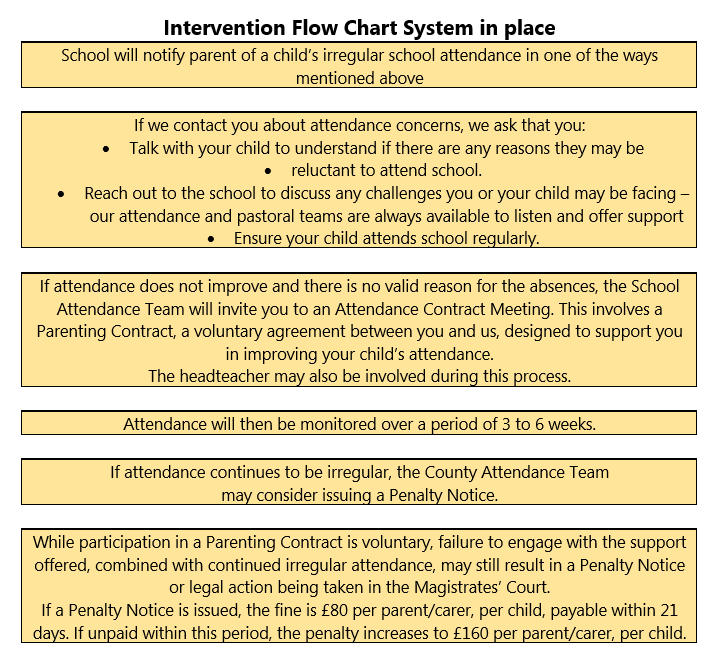
Attendance
Telephone: 01296 484434
Email: attendance@ashmeadschool.org.uk
Attending school regularly is key to unlocking the full range of benefits education offers—supporting your child’s learning, wellbeing, and overall development. We are committed to fostering strong relationships and creating a welcoming school environment where children feel safe, valued, and eager to learn.
Parents and carers have a legal responsibility to ensure their child receives a full-time education and attends school consistently. When children are absent, they miss more than just lessons—they miss opportunities to build friendships, make academic progress and take part in the everyday school activities.
We do, of course, recognise that there are times when absence is unavoidable and entirely reasonable. This information outlines the steps we are taking to support and manage attendance in our school community.
Attendance Team (ID 1444)
-
Cheryl ThompsonAssistant Head - Community and Communication
Cheryl Thompson
-
Geraldine WhitlamOffice Administrator
Geraldine Whitlam
-
Leon HardingPastoral Teaching Assistant
Leon Harding
-
Azra MatloobTeaching Assistant/Translator
Azra Matloob
-
Kirsty LubbockLead for Safeguarding and Pastoral Care
Kirsty Lubbock
-
Izi FernandezDeputy DSL
Izi Fernandez
-
Lee CDeputy DSL
Lee C
/i/video/Video_ACS_Attendance.mp4
Illness and First Day Call
If your child is unwell and unable to attend school, please inform us by phone on the first day of absence. Our phone lines are open from 7:30am, and we ask that you contact us before 8.30am, where possible. Alternatively, you can email us at attendance@ashmeadschool.org.uk. For longer absences, we ask that you keep us regularly updated.
If you're unsure whether your child is well enough to attend, we recommend sending them in and informing us of your concerns. We will monitor them throughout the day and contact you if it becomes necessary to send them home.
If no reason has been provided for a child’s absence, we are required—under our safeguarding responsibilities—to contact you to confirm your child’s whereabouts. If we are unable to reach you and no reason is provided, the absence will be recorded as unauthorised. As outlined in the new statutory national framework for schools, repeated unauthorised absences can result in a penalty fine.
New National Framework for Attendance
Last year, the Department for Education introduced stricter legislation on school attendance and published updated mandatory guidance for all schools to follow. This includes a new national framework for penalty notices, with a consistent threshold for when such notices must be considered. This includes when:
- A child is absent for 10 or more unauthorised sessions (equivalent to five school days) within a rolling ten school week period.
- Taking a term time holiday of 5 days or more.
There is an increase in the penalty fine (from £60 to £80) if paid within 21 days. If the fine is not paid by the first 21 days, it will rise to £160 with no option to pay the lower rate of £80. Where a penalty notice is unpaid, legal action would be pursued. The full guidance from the DFE can be found online.
https://www.gov.uk/government/publications/working-together-to-improve-school-attendance
Please note that this framework is a national one and applies to all schools, not just Ashmead.
When a child is unwell, their absence is recorded as authorised by the school. However, if we notice frequent or recurring absences, we may need to speak with you to better understand any underlying issues. In most cases, medical evidence is not required. However, if your child is regularly absent due to illness, we may request supporting evidence. Without this, ongoing absences may be recorded as unauthorised. Acceptable forms of evidence include appointment cards, copy of prescriptions, hospital appointment letters or notes from previous consultations—these can also be provided via the NHS App.
Medical/Dental Appointments
Where possible, we encourage medical and dental appointments to be scheduled outside of school hours. However, we understand this isn’t always possible. If your child needs to attend an appointment during the school day, we ask that they come to school before the appointment, and return promptly afterwards, to minimise lost learning time. These appointments will be recorded as authorised absences.
We are already aware of children with serious or long-term medical conditions, and these circumstances are, of course, considered. However, it is essential that the attendance team is fully informed of any ongoing health issues. If your child requires continued medical treatment, please speak with us.
Punctuality
Children are welcome to arrive at school from 8:35am, ready for learning to start promptly at 8:45am. Arriving late can cause several issues—your child may miss important instructions at the start of the day, which can lead to confusion, increased stress, and lost learning time. It can also be unsettling for them to enter the classroom once lessons have already started. Over time, even small amounts of lateness can have a significant impact. For example, being just 15 minutes late each day adds up to the equivalent of 10 full days of lost learning over the course of a school year.
Under the new national attendance framework, frequent lateness may now result in a penalty fine. We appreciate your support in ensuring your child starts each day on time and ready to learn.
We have spaces available in our free Breakfast Club, which is open to all children from 8:15am. If you would like to request a place, please contact our Assistant Head, Mrs Cheryl Thompson, via the school office. Attending Breakfast Club can support a calm and settled start to the day and ensures your child is in school on time for registration at 9:00am.
Emergency Absence
There may be occasions when it is not appropriate for a child to attend school. In such cases, we will take a compassionate approach and may authorise the absence if the circumstances are exceptional—meaning they are rare, significant, unavoidable, and of short duration.
Please try to ensure that your child arrives at school so that they are present for registration; this is completed at 9.00 am each day but children are welcome to enter school from 8.40 am, ready for learning to start at 8.45 am. The meeting and exchanging of news with friends before school is important for a child’s social development. Lateness can cause additional problems, such as missing instructions from teachers about the format of the day. It can also be embarrassing for your child and lead to increased stress if they have to walk in late to a session, as well as being detrimental to their learning. Worryingly, it all adds up over time; for instance, missing just 15 minutes each day is the equivalent to missing 10 days learning over a school year. Because of the new national framework for attendance, if your child is frequently late into school, this may now result in a penalty fine.
Holidays in Term Time
For any holidays taken during term time, please notify the school at least four weeks in advance. Please note that current legislation prohibits schools from authorising term-time holidays. If you choose to take your child out of school for five or more days during term time, we are required to report this absence to the County Attendance Team. When leave is unauthorised, the Governing Body supports issuing a fixed penalty fine, which can be costly.
Persistent Absenteeism (PA)
The Department for Education considers attendance below 90% as persistent absence. A pupil is classified as a ‘persistent absentee’ when they miss 10% or more of school sessions during the year, regardless of the reason. Absences at this level significantly impact a child’s education, and we need your full support and cooperation to address this issue.
It All Adds Up!
We aim for a school attendance rate of 95% or higher. As parents, you play a crucial role in your child’s academic success, and the foundation of that success begins with good attendance habits. Attendance at 95% means no more than 9.5 days of absence throughout the school year.
How do we monitor attendance?
At Ashmead, we monitor each child’s attendance on a weekly basis, carefully reviewing all reasons for absence. Each week, we identify pupils whose attendance has either reached, or is approaching, the threshold for Persistent Absence. When we determine that intervention is necessary, we will take appropriate action, which may include sending an email, inviting you to meet with a member of the attendance team, making a phone call, or issuing an attendance letter.
We then closely monitor attendance over the following three weeks, expecting to see consistent improvement.
Intervention Flow Chart

Although formal sanctions may be used, our preference as a school is to work collaboratively with you and your family to build strong, supportive relationships and address any challenges together.
The effects of irregular attendance
Regular school attendance greatly increases the chances of your child succeeding academically and feeling connected to their school community. Even missing just a day or two each month can add up to several weeks of lost learning over the course of a year. It’s important to understand that irregular attendance can significantly impact your child’s development and future opportunities. We are committed to ensuring that poor attendance does not become a barrier to your child’s success.
At the same time, we understand that challenges can sometimes make regular attendance difficult. Our attendance and pastoral teams are here to support you with issues such as morning routines, anxieties, or transport difficulties, through tailored pastoral interventions and breakfast provision, for example.
Being in school helps support your child’s learning, establish strong routines and build friendships that are essential for their wellbeing and development. For more information about who to contact for support—including the school’s senior leader responsible for attendance—please visit our website Ashmead School - Attendance
Mental Health/Long Term Illness/Special Educational Needs and Disabilities
If your child is regularly absent from school due to illness—whether physical or mental health-related—or because of special educational needs or a disability, they are entitled to the same full-time education as every other child.
We are committed to supporting your child and ensuring they can access their education. This may include:
- Working closely with you to make reasonable adjustments to help improve attendance, such as changes to uniform, transport arrangements, daily routines, or lunchtime provisions
- Providing tailored pastoral care to support your child’s emotional and social needs
Our dedicated Pastoral Support Team is available to offer sensitive, personalised support to pupils facing these challenges. Every case is handled individually to ensure the most appropriate and effective support is in place.

Types of Absence
Each absence from school is recorded as either authorised or unauthorised. When a child is unwell, their absence is recorded as authorised by the school. However, if your child is regularly absent due to illness, we may request supporting evidence. Acceptable forms of evidence include appointment cards, copy of prescriptions, hospital appointment letters or notes from previous consultations—these can also be provided via the NHS App. Without this, ongoing absences may be recorded as unauthorised.
Absences are also recorded as unauthorised when no explanation is given or the reason provided is not deemed acceptable.
Unacceptable Reasons for Absence
The following are examples of reasons that are not considered acceptable for school absence:
- Shopping trips
- Taking a day off for a birthday
- Caring for other family members
- Family outings or visits to theme parks
- Absence due to parents’ work commitments
- Holidays taken during term time
- Absence due to parental illness
- Accompanying parents or siblings to their appointments
Support First Approach
The importance of regular school attendance cannot be overstated. All schools have a duty to promote good attendance and to support families in overcoming any barriers that may prevent a child from attending regularly.
This means we may sometimes raise concerns about attendance, even if your child has only been off for a few days. This is not because we doubt the reason for their absence, but because early intervention can help prevent attendance patterns from becoming a longer-term issue. It also gives us the opportunity to work with you to identify and address any underlying factors that may be making school attendance difficult for your child.
For this support to be effective, it is essential that parents and carers work in partnership with the school. If you have any concerns about attendance or would like to discuss support options, please get in touch with our Attendance Team at attendance@ashmeadschool.org.uk.
Our duty of care
We share a duty of care with the Local Authority to address and challenge poor school attendance. When attendance is low, and there are frequent absences without valid reasons—such as unauthorised holidays or absences the school does not approve—parents may be issued a penalty notice. This carries a fine of £80 per parent, per child, which increases to £160 if not paid within 21 days.
We hope this information helps clarify the school’s expectations around attendance. If you have any concerns or are experiencing difficulties that may be affecting your child’s attendance, please contact us. Our team is here to support you and your family.







